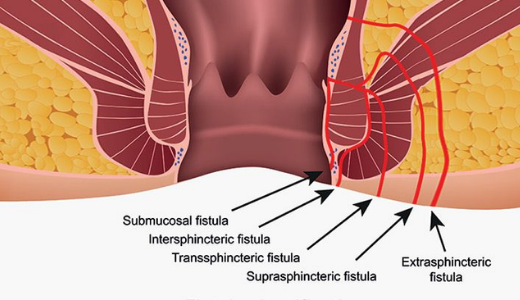Fistula Treatment In Noida

Fistula
What are fistula?
An anal fistula is a small tunnel that connects an abscess, an infected cavity in the anus, to an opening on the skin around the anus.
The anus is the external opening through which feces are expelled from the body. Just inside the anus are a number of small glands that make mucus. Occasionally, these glands get clogged and can become infected, leading to an abscess. About half of these abscesses may develop into a fistula.
Symptoms of Anal Fistula
The signs and symptoms of an anal fistula include:
- Frequent anal abscesses
- Pain and swelling around the anus
- Bloody or foul-smelling drainage (pus) from an opening around the anus. The pain may decrease after the fistula drains.
- Irritation of the skin around the anus from drainage
- Pain with bowel movements
- Bleeding
- Fever, chills and a general feeling of fatigue
You should see your doctor if you notice any of these symptoms.
Who's at Risk
Anal fistulas are more common in men. However, women also get them. They are also more common in those 30 to 50 years old. Other things that may raise the risk are:
- Previous history of anal abscess or fistula
- Crohn disease
- Ulcerative colitis
- Trauma
- Previous surgery or radiation therapy
- Cancer
- Certain infections, including HIV and tuberculosis
Diagnosis of Anal Fistula
Your doctor can usually diagnose an anal fistula by examining the area around the anus. He or she will look for an opening (the fistula tract) on the skin. The doctor will then try to determine how deep the tract is, and the direction in which it is going. In many cases, there will be drainage from the external opening.
Some fistulas may not be visible on the skin's surface. In this case, your physician may need to perform additional tests:
- An anoscopy is a procedure in which a special instrument is used to see inside your anus and rectum.
- Your physician may also order an ultrasound or MRI of the anal area to get a better view of the fistula tract.
- Sometimes your surgeon will need to examine you in the operating room (called exam under anesthesia) to diagnose the fistula.
Anal Fistula Treatment
Surgery is almost always necessary to cure an anal fistula. The surgery is performed by a colon and rectal surgeon. The goal of the surgery is a balance between getting rid of the fistula while protecting the anal sphincter muscles, which could cause incontinence if damaged.
Fistulas in which there is no or little sphincter muscle involved are treated with a fistulotomy. In this procedure, the skin and muscle over the tunnel are cut open to convert it from a tunnel to an open groove. This allows the fistula tract to heal from the bottom up.
In the case of a more complex fistula, the surgeon may have to place a special drain called a seton, which remains in place for at least 6 weeks. After a seton is placed, a second operation is almost always performed
- a)painless bleeding from the anal area,
- b)anal itching,
- c)pain in the anal area,
- d)swelling and feeling a lump at the anus are all associated with an inflamed hemorrhoid.
Prevention from Anal Fistula
The risk of anal fistula may be lowered by:
- Carefully cleaning and treating anal/rectal wounds
- Managing certain health conditions









